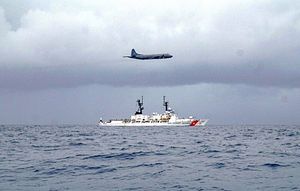The U.S. coast guard, in coordination with Canada’s Department of Fisheries and Oceans (DFO), conducted exclusive economic zone (EEZ) patrols in the South Pacific. The effort focused on enforcing the fisheries laws of Fiji and Tuvalu.
“The presence of a high endurance Coast Guard cutter conducting operations in the region demonstrates the U.S. commitment to regional partnerships and strengthening a coalition of like-minded countries to strengthen regional maritime governance and promote a rules-based regime for fisheries,” a U.S. Coast Guard statement noted in January.
The primary U.S. vessel involved in the EEZ enforcement activity is the Coast Guard cutter Mellon. “The U.S. is advancing a vision of a free and open Indo-Pacific that excludes no nation. We are redoubling our commitment to establish alliances and partnerships while expanding and deepening relationships with new partners that share respect for sovereignty, fair and reciprocal trade, and the rule of law,” said Capt. Robert Hendrickson, chief of response for the U.S. Coast Guard’s 14th District in a statement. “We rely on partners, allies, and like-minded nations to achieve our missions.”
The partnership efforts with Canada began last year, according to Hendrickson. “Coast Guard 14th District personnel began partnering with Canada’s DFO in July when two DFO officers joined U.S. Coast Guard Cutter Sequoia (WLB 215) for a 23-day patrol on high seas west of Guam,” said Hendrickson.
The Mellon transited from the U.S. Pacific state of Hawaii to Fiji in January, with two Canadian officers on board. The purpose of the coordinated fisheries enforcement activities between the two countries is to prevent illegal, unreported, and unregulated (IUU) fishing — a major concern for Pacific Island states and small island developing states across the world.
The U.S. Coast Guard has framed its ongoing activities as part of the broader U.S. strategic effort to support a “free and open Indo-Pacific.” Hendrickson underscored joint U.S.-Canada cooperation in this regard. “Working together we are helping to ensure a more secure, free and open Indo-Pacific,” he said.
In addition to basing two DFO officers on the Mellon, the Canadian Air Force dispatched a CP-140 Aurora aircraft to provide maritime domain awareness to the Mellon for two weeks, according to a statement by DFO. The Aurora conducted seven reconnaissance flights in the area to support the U.S. Coast Guard mission by sharing data.
The Mellon is crewed by 150 coast guardsmen and is homeported in Seattle. Its ongoing deployment to the South Pacific began in late December 2018. In a January statement on the Mellon’s deployment, the Coast Guard emphasized direct U.S. economic interests in the South Pacific, which is an area of touristic interest to Americans and a major source of fish exports.

































